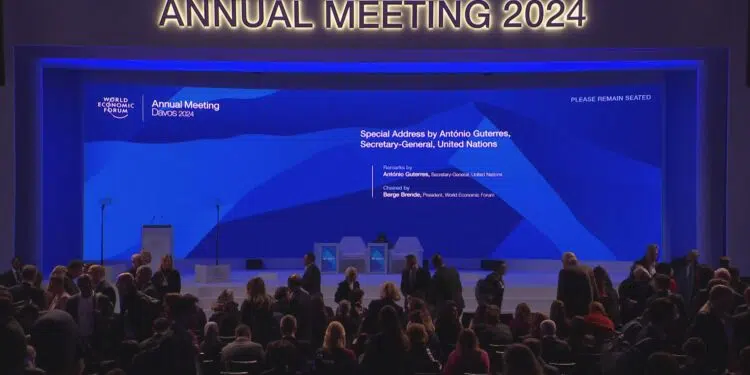Brussels – Cooperation and multilateralism. The answer to crises and tensions is teamwork at a global level: The World Economic Forum in Davos this year, almost forgotten because of the conflicts in Ukraine and the Middle East that continue with great intensity spilling over to the political debate, saw the European Union play the role of ‘peacemaker’ and mediator in a global context that is as uncertain as ever.
Thanks also to a friendly calendar, which saw rotating podium positions with European Commission President Ursula von der Leyen finding herself trying to dictate a line that speakers before and after her followed. “This is the time to drive global collaboration more than ever before,” she said: “Europe is in a unique position to promote this global solidarity and cooperation.”
The message risked getting lost in the many working sessions of a summit organized on so many levels and in so many moments, all different. But it returned to the spotlight just a few hours later. The next day, UN Secretary-General, Antonio Guterres revived the EU agenda, warning how “geopolitical divisions are hampering a global response to challenges such as climate change and artificial intelligence,” and this is why a “reformed, inclusive, and interconnected multilateralism” is needed.
In principle, the Biden administration also shares the calls for a global and globalized world. U.S. Secretary of State Antony Blinken, who was in Davos the day after von der Leyen, was clear about the need for “global partnerships and cooperation” to solve our biggest challenges. However, this is the vision of an outgoing government awaiting the end-of-year election test, which could reshape agendas and balances. The EU fears a return of Donald Trump to the White House for its consequences. The concern is that with Trump the exact opposite of what was underlined and argued in Davos will happen: divisions instead of cooperation.
Ethiopia’s Deputy Prime Minister and Minister of Foreign Affairs, Demeke Mekonnen Hassen, answers the EU’s proposals for mediation and inter-relationships on the fourth day. The whole African world is also interested in the cooperation agenda. As long as it is not treated in a marginal or neo-colonial way. On the contrary, “Africa must play a central role worldwide for multilateralism and in the international arena on trade, investment, and other economic activities.” Politics will deal with the dynamics of bilateral and regional relations. However, the World Trade Organization (WTO) Director General, Ngozi Okonjo-Iweala, underlined that “without a free flow of trade, I don’t think we can recover” economically.
Go ahead with free trade and international relations, then. “We must avoid a rush for subsidies, we cannot afford it“, stressed the German Finance Minister, Christian Lindner. The European Union in Davos seems to have touched and hit a key point. It certainly dictated the debate organized over several days. The real challenge is to make this line dictated at Davos the international political agenda for the coming months.
As for the EU, the president of the European Central Bank, Christine Lagarde, has no doubts: Europe must do its homework. The head of the Eurotower was among the last guests to speak on the last day of the Davos summit. And there, speaking about the prospect of a Trump’s return to the leadership of the United States, she invited all the EU Member States to push on the reform agenda. “The best defense, if that’s the way we want to look at it, is attack“, Lagarde stressed. “To attack properly, you need to be strong at home”, she added. “Being strong means having a strong, deep market. Having a real single market”.
One of the answers to a possible Trump’s return involves the European integration process, as Lindner stated clearly. “Our competitive disadvantage compared to the U.S. is not subsidies but the function of our private capital market”.







